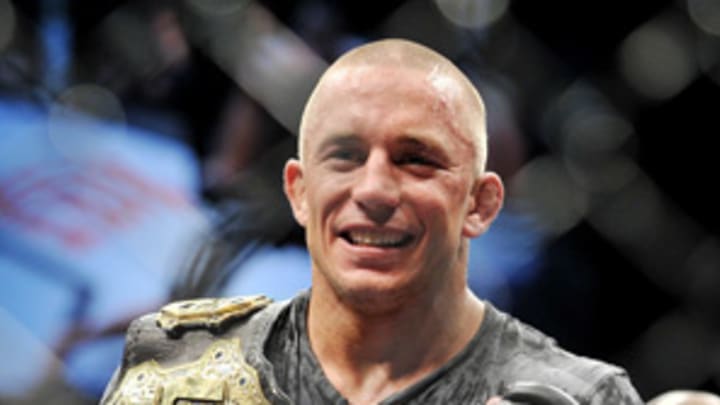Georges St. Pierre: The meaning of 100


Prior to UFC 100, SI.com had the chance to speak with many of the promotion's elite fighters -- past and present. Here's what Georges St. Pierre had to say about Saturday's card, his career in the cage and much more.
It's a great honor to fight in UFC 100. I'm fighting on a card with some other great guys, like Brock Lesnar, Frank Mir, Henderson, Bisping and others.
I would say this is the UFC's most significant card. It's historical. People will remember this night for forever. It's UFC 100.
I, honestly, knew that it would be a very popular sport, but what amazed me was how fast it grew.
I remember just a few years ago, where I come from in my country, the sport was not known at all. Now, everywhere I walk, people come up to me and they ask me for my autograph and picture.
I would like to see the sport become more mainstream and be accepted in every place in the world.
Never underestimate your opponent. That's something that I learned when I lost the fight to Matt Serra, and it was a very valuable lesson.
When you fight someone, don't underrate them, but don't overrate them as well. Don't respect them too much, but still respect them -- you have to be in the middle. My coach told me that.
The best moment of my career was when I won my title in Montreal, when I beat Serra in Montreal. It was the best moment of my career because I was fighting in my hometown and also because it was the day that I was getting my revenge. I beat somebody who was saying a lot of bad things about somebody who beat me when I was supposed to win. So it was a great day for me.
Trash-talking always gives you more motivation to train. It's never a bad thing. That's why I never trash-talk to my opponent. I respect everybody.
The biggest obstacle the UFC faces is the stubborn people in politics who don't want to see the sport become legal and, I would say, it's because of their lack of education of the sport. Same thing with me when I first saw the UFC. I liked it, but I thought it was a brutal sport before I start really knowing the technique and what was happening. But when I gained more knowledge with my jiu-jitsu and ground fighting, I became a fan and an admirer of the UFC.
I would like to fight in France, either in Paris or Monaco. I would like to fight in New York, too. Madison Square Garden would be great. I wish UFC 100 would have happened at Madison Square Garden.
After a fight, I'm tired of training, so I take a vacation or take some days off. But after two or three days I come back ready to go. I'm an MMA maniac. I love it!
The toughest fighter that I've fought is Jon Fitch. This guy is like the Terminator. I tried to finish him and he stayed with me for a five-round war. It was the toughest fight of my career.
There are good things -- all the fame, the jet-setting -- and bad things about fighting. When you want to have a personal life and you want to be left alone, it's pretty hard. It's a very stressful job and it can influence your well-being.
Playing tennis doesn't influence your well-being because you're not going to die if you play tennis. Fighting, you can get a concussion or break your leg, and that can influence your well-being.
When I first started, I was really nervous before fights, but with experience, you learn how to control it.
The only thing I regret is, when I do training camp and I have great moments during training -- all those good times I have training for a fight -- I'm so stressed that I forget to take pictures of it. Those are the things that I regret. I should take more pictures of those moments I share with my friends in training. And I don't have those moments on tape, so I can't share those with my future kids. It's in my memory, but I would like to have a souvenir that I can share with people.
There's nothing impossible in this world. Everything starts with a dream, and you need to pursue it until you reach it.
You can look forward to seeing world welterweight champion Georges "Rush" St. Pierre. That's what you can look forward to.
